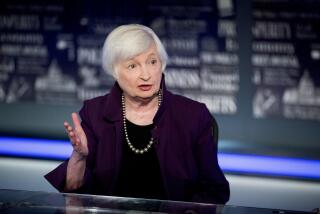Senate panel grills bond-rating firms
- Share via
WASHINGTON — Executives from major bond-rating firms were accused by senators Wednesday of being hampered by conflicts of interest that may have contributed to the mortgage market turmoil rattling investors worldwide.
Critics say Standard & Poor’s, Moody’s Investors Service and Fitch Ratings failed to give investors adequate warning of the risks associated with mortgage-backed securities, which have plunged in value as home loan defaults have soared, particularly among borrowers with weak credit histories.
Several members of the Senate Banking Committee asked rating-firm executives whether they provided advice to investment banks that issue mortgage securities. The Securities and Exchange Commission has been looking at whether Wall Street prodded firms for higher ratings on mortgage securities, SEC Chairman Christopher Cox said.
Vickie Tillman, executive vice president at S&P;, said the unit of McGraw-Hill Cos. didn’t collaborate with investment banks that sell mortgage bonds but did have an “open dialogue” with them.
Senators also expressed concern about the fact that rating firms get paid by the issuers of bonds they rate. Sen. Jim Bunning (R-Ky.) likened the business model to a studio’s paying a critic to write a movie review, then using it to promote the film.
Executives from S&P; and Moody’s said their methodology for monitoring the risks of mortgage-backed bonds was sound, but they also pledged to make improvements.
Sen. Charles E. Schumer (D-N.Y.) suggested that rating firms should be paid by debt investors rather than issuers. But Stephen Joynt, chief executive of Fitch, said that might not be workable.
Moody’s called for requiring outside firms to review loan data given to mortgage-bond investors.
Moody’s stock, which closed at $60.89 on July 11, rose $1.32 on Wednesday to $47.39.
More to Read
Inside the business of entertainment
The Wide Shot brings you news, analysis and insights on everything from streaming wars to production — and what it all means for the future.
You may occasionally receive promotional content from the Los Angeles Times.










